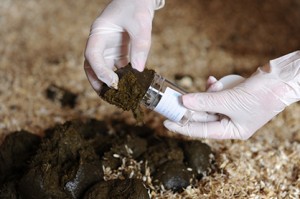Survey Shows 20% of Horse Owners Unaware of Encysted Small Redworm Risk
This year’s annual National Equine Health Survey*, held in May, has revealed that one in five owners who claimed to have treated for encysted small redworm (ESRW) used a wormer that was not indicated to treat these potentially lethal encysted parasites. This may leave horses at serious risk, said the worming experts at Zoetis, who recently introduced a campaign to help inform and educate about the dangers of ESRW.
Encysted small redworms are one of the most common and harmful worms found in horses. They are the larval stages of the small redworm that have buried into the lining of the gut where they can lie dormant for some time. They pose a potentially fatal health risk but won’t show up in a standard faecal worm egg count. Untreated, encysted small redworm may develop and emerge en masse from the gut wall in the early spring, causing diarrhea and colic with a mortality rate of up to 50%1
“The veterinary recommendation is that all horses should receive a treatment for ESRW during the late autumn/winter, regardless of their faecal worm egg count,2,3” said Wendy Talbot, National Equine Veterinary Manager at Zoetis. “It’s crucial to remember that even if your horse’s faecal worm egg count is negative you must still treat for encysted small redworm before the early spring, to protect your horse from this deadly parasite.”
Learn more about the Zoetis encysted small redworm awareness campaign at www.esrw.co.uk and test your knowledge before discussing the best treatment options with your vet or Suitably Qualified Person (SQP). The site contains an informative video, a quick quiz and a helpful advice leaflet that can be downloaded.
For further information, visit www.wormingyourhorse.info. You can also download Stable Mate, the horse health management App from Zoetis. It is available from the iPhone App Store and Google Play Store: text Stable Mate to 80800 to download. (Standard network charges apply. By responding to this text you are consenting to your data being held either within or outside the EEA and processed by or on behalf of Zoetis to administer and manage any matters relating to Zoetis’s future activities or initiatives. For our full privacy policy visit www.zoetis.com).
References
1. Dowdall S.M.J. et al (2002) Veterinary Parasitology 106, 225‑242
2. Nielsen (2012) Veterinary Paristology. 185. 32-44
3. AAEP (2013) Parasite Control Guidelines
* The National Equine Health Survey, conducted by the Blue Cross and supported by Zoetis, was completed by 3,669 horse owners in May 2014. The survey contained 25 questions on general horse health, care and management and was validated by Professor Josh Slater of the Royal Veterinary College.
About Zoetis
Zoetis (zō-EH-tis) is the leading animal health company, dedicated to supporting its customers and their businesses. Building on more than 60 years of experience in animal health, Zoetis discovers, develops, manufactures and markets veterinary vaccines and medicines, complemented by diagnostic products and genetic tests and supported by a range of services. In 2013, the company generated annual revenues of $4.6 billion. With approximately 9,800 employees worldwide at the beginning of 2014, Zoetis has a local presence in approximately 70 countries, including 27 manufacturing facilities in 10 countries. Its products serve veterinarians, livestock producers and people who raise and care for farm and companion animals in 120 countries. For more information, visit www.zoetis.com.
Zoetis UK Ltd, Walton Oaks, Dorking Road, Walton-on-the-Hill, Tadworth, Surrey KT20 7NS











